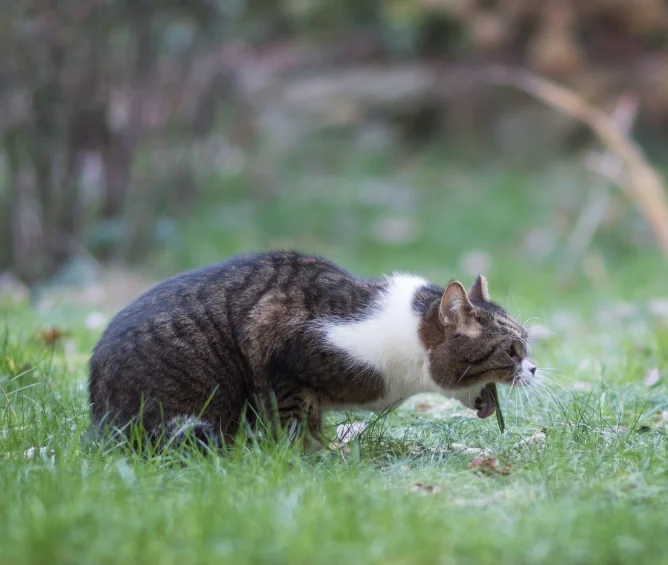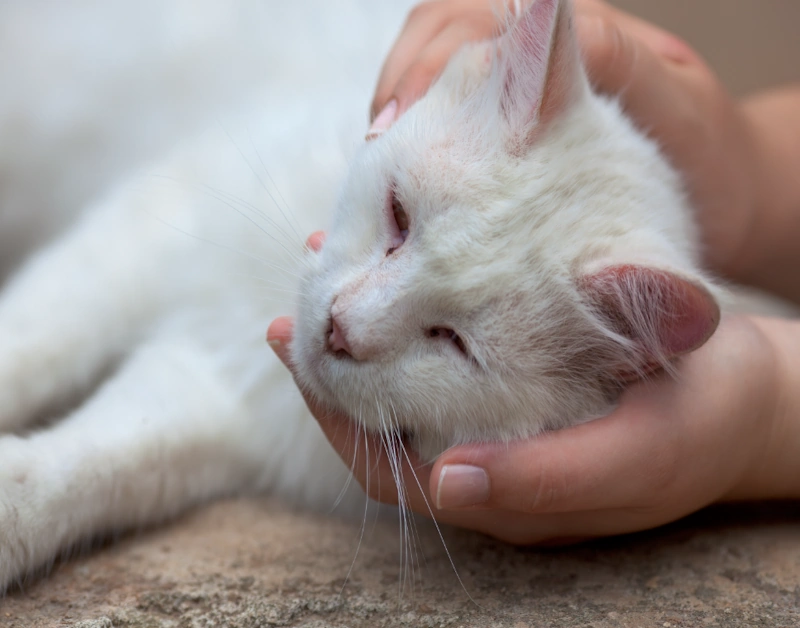Seeing your cat vomiting blood can be an alarming and stressful experience for any pet owner. Cats are known for their independence and resilience, but this symptom is a clear indication that something is wrong. Understanding the potential causes, symptoms, and treatments for a cat vomiting blood is crucial to ensuring your feline friend receives the care they need.
If your cat is vomiting blood, it’s important to act quickly and consult with a veterinarian. At Sunshine Pet Hospital, we are here to help your cat recover and provide them with the compassionate, expert care they deserve. Contact us today to schedule an appointment if your cat is experiencing this concerning symptom.
Understanding Hematemesis (Vomiting Blood in Cats)

The medical term for vomiting blood is “hematemesis.” The blood in the vomit can appear as fresh, bright red, or as partially digested, which typically looks like dark coffee grounds. Both types of blood in your cat’s vomit can signal serious underlying health issues.
There are various potential causes for hematemesis in cats, some more severe than others. Regardless of the cause, it is crucial to seek veterinary care if your cat is vomiting blood.
Common Causes of Vomiting Blood in Cats
Several underlying conditions can cause a cat to vomit blood. Here are some of the most common cat vomiting blood causes:
1. Gastrointestinal Ulcers
Gastrointestinal ulcers are one of the primary causes of vomiting blood in cats. These ulcers can develop due to medications (like nonsteroidal anti-inflammatory drugs), infections, or other health conditions. Ulcers may erode the lining of the stomach or intestines, causing blood to leak into the gastrointestinal tract, which can then be expelled through vomiting.
2. Foreign Objects
Cats are naturally curious creatures, and they sometimes ingest foreign objects that they shouldn’t, such as string, small toys, or household items. When a foreign object becomes lodged in the digestive tract, it can cause internal injuries or blockages, leading to cat vomiting blood. This is a medical emergency that requires immediate attention.
3. Infections
Infections caused by bacteria, viruses, or parasites can irritate and inflame the gastrointestinal system. If left untreated, severe infections can cause internal bleeding, which may lead to vomiting blood. Common infections that can affect a cat’s digestive system include feline parvovirus (panleukopenia) and parasitic infections like hookworms.
4. Toxins and Poisoning
Ingesting toxic substances is another potential cause of cat vomiting blood. Certain plants, chemicals, medications, and household cleaners can be extremely harmful to cats and cause internal bleeding. Common toxins include rat poison (which contains anticoagulants), antifreeze, and some human medications, such as aspirin or ibuprofen. If you suspect your cat has ingested something toxic, contact your veterinarian or an emergency animal clinic immediately.
5. Trauma or Injury
Physical trauma, such as being hit by a car, falling from a height, or fighting with another animal, can lead to internal injuries, resulting in cat vomiting blood. Even if there are no visible external wounds, internal bleeding can occur, especially if the abdomen or chest has been impacted.
6. Cancer
Unfortunately, cancers of the digestive tract, such as stomach or intestinal cancer, can cause hematemesis in cats. Tumors can erode the walls of the digestive organs and lead to internal bleeding. While this cause is more common in older cats, it is still something that should be ruled out by your veterinarian.
7. Inflammatory Bowel Disease (IBD)
Cats suffering from inflammatory bowel disease (IBD) may experience chronic vomiting, diarrhea, and sometimes vomiting blood. IBD is a condition where the intestines or stomach become inflamed, often due to an abnormal immune response. While IBD is a chronic condition, it can be managed with the help of a veterinarian.
8. Liver or Kidney Disease
Liver and kidney disease can both lead to gastrointestinal problems, including vomiting blood. Cats with these conditions may not be able to process toxins properly, leading to damage to the stomach or intestines. Cats with advanced liver or kidney disease may exhibit additional symptoms such as jaundice, lethargy, and weight loss.
Schedule a vet consultation today!
Signs and Symptoms to Watch For
In addition to cat vomiting blood, cats may show other signs and symptoms that indicate an underlying health issue. These symptoms can help your veterinarian diagnose the root cause of the problem:
👉Lethargy or weakness
👉Loss of appetite or refusal to eat
👉Abdominal pain or swelling
👉Diarrhea (sometimes with blood)
👉Pale gums or mucous membranes
👉Excessive drooling
👉Weight loss
👉Difficulty breathing
It’s essential to monitor your cat closely and take note of any other symptoms they may be displaying. Providing this information to your veterinarian can help them diagnose and treat your cat more effectively.
Diagnosis: What to Expect from Your Veterinarian
When you bring your cat to the veterinarian for cat vomiting blood, the vet will likely perform a comprehensive examination to determine the cause of the hematemesis. This examination may include:
✅Physical exam: The vet will palpate your cat’s abdomen to check for pain, swelling, or abnormalities.
✅Blood tests: These tests can assess liver and kidney function, check for infections, and detect anemia (a common side effect of internal bleeding).
✅X-rays or ultrasounds: Imaging can help identify any foreign objects, tumors, or abnormalities in the digestive tract.
✅Endoscopy: This procedure allows the vet to visualize the inside of your cat’s stomach and intestines, and take biopsies if necessary.
✅Fecal examination: A stool sample may be tested to check for parasites or other infections.
Treatment Options for Cats Vomiting Blood
Treatment for hematemesis in cat vomiting blood depends on the underlying cause. Some possible treatments include:
💊Medications: Your veterinarian may prescribe medications to reduce stomach acid, heal ulcers, or treat infections.
💊Fluid therapy: If your cat is dehydrated due to vomiting, intravenous fluids may be necessary to stabilize them.
💊Surgery: If a foreign object is causing internal injuries or blockages, surgery may be required to remove it.
💊Dietary changes: In cases of inflammatory bowel disease or gastrointestinal sensitivity, your veterinarian may recommend a specialized diet to reduce inflammation and prevent future vomiting.
💊Hospitalization: In severe cases, your cat may need to be hospitalized for intensive care, especially if there is significant internal bleeding or a life-threatening condition.
When to Seek Emergency Veterinary Care
Cat vomiting blood is always a sign of a serious issue, and it’s crucial to seek veterinary care immediately. However, there are certain situations where you should consider it an emergency:
🚑The blood is bright red and appears in large quantities.
🚑Your cat is showing signs of extreme weakness or collapse.
🚑Your cat is vomiting repeatedly and is unable to keep food or water down.
🚑There is a possibility your cat ingested a toxic substance.
Preventing Vomiting Blood in Cats
While it’s not always possible to prevent every instance of vomiting blood, there are steps you can take to reduce your cat’s risk:
1️⃣Keep harmful chemicals, medications, and toxic plants out of reach.
2️⃣Provide a balanced diet and ensure they have access to fresh water.
3️⃣Regularly take your cat to the vet for check-ups, especially as they age.
4️⃣Monitor your cat’s environment for small objects they could swallow.
Conclusion: Take Action for Your Cat’s Health
If your cat is vomiting blood, don’t delay in seeking veterinary care. While some causes may be less severe, others can be life-threatening. At Sunshine Pet Hospital, we understand how much you care about your cat’s well-being, and we’re here to provide the expert care and attention your pet needs. Contact us today to schedule an appointment and ensure your cat receives the best treatment possible in Aurora, IL


